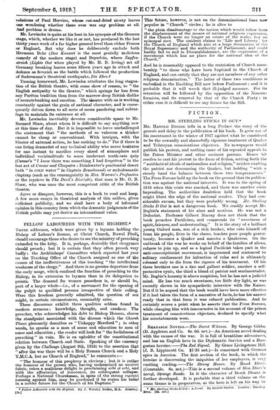FELLOW LABOURERS WITH THE HIGHEST.* THESE addresses, which were given
by a layman holding the Bishop of Lahore's licence, at Christ Church, Rawal Pindi, shoal encourage those who desire to see the ministry of preaching extended to the laity. It is, perhaps, desirable that clergymen should preach ; but it is certain that they often preach very badly : the Archbishops' Committee which reported last year
on the Teaching. Office of the Church assigned as one of the causes of the ineffectiveness of this teaching " the intellectual weakness of the clergy." And there is no greater departure from
the early usage, which confined the function of preaching to the Bishop, in its extension to laymen than in its delegation to priests. The demand for women preachers is, or should be, part of a larger whole—i.e., of a movement for the opening of the pulpit to qualified persons irrespective of their calling. Were this freedom generally admitted, the question of sex might, in certain circumstances, reasonably arise.
These discourses exhibit three qualities seldom found in
modem sermons : knowledge, thought, and candour. The preacher, who acknowledges his debt to Bishop Henson, shares the standpoint associated with the diocese which the Church Times pleasantly describes as " Unhappy Hereford " ; in other words, he speaks as a man of sense and education to men of sense and education ; the reader will look for " the foolishness of
preaching " in vain. He is an upholder of the constitutional relation between Church And State. Speaking of the currency given by the Challenge (August 9th, I9l8) to the assertion that " after the war there will be a Holy Roman Church and a Holy Y,M.C.A. but no Church of England," he comments
The humour of this prophecy is obvious ; but it is rather the humour of the person who, having undermined an ancient fabric, takes a malicious delight in proclaiming urbi et orbi, and with the affectation of innocence, its subsequent collapse. Perhaps a National Churchmen, in spite of the strong current running against him, may be pardoned if he states his belief in a nobler future for the Church of his Baptism."
• Fellow Zama= with the Righest. By J. Wornley Bairn, Bombay. 1204
This future, however, is not on the denominational lines now popular in " Church " circles ; he is alive to " the plain disadvantage to the nation which would follow from the displacement of the means of national religious expression, if the Church were no longer an estate of the realm, but an episcopal sect. The strident claims to 'Life and Liberty' for the Church of England which aim at a large diminution of the Royal Supremacy and the authority of Parliament, and could hardly fail to end in Diseatahlishment, are the expression of a movement which has no place for the national idea of the Church."
And he is reasonably opposed to the restriction of Church mem- bership " to those who have been baptized in the Church of England, and can certify that they are not members of any other religious denomination." The latter of these two conditions is embodied in the Enabling Bill now before Parliament ; and it is probable that it will wreck that ill-judged measure. For its retention will be followed by the opposition of the Noncon- formists, and its removal by that of the Church Party : iu either case it is difficult to see any future for the Bill.


































 Previous page
Previous page